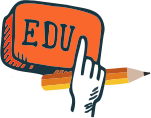
For greater than twenty years, U.S. main grade kids have carried out in addition to or better than most children in the world, whereas the efficiency of older U.S. youngsters has been mediocre to poor. On the most recent TIMMS science exam, U.S. four th graders have been out-carried out by just one country in the world— South Korea.
Educational paths and transitions
And it offers a menu of greater than 200 hourlong experiential packages for students, known as “explorations,” pegged to the state’s academic requirements. And but, there is proof—on a large scale—that this type of elementary curriculum can reduce inequality, because of an unintentional experiment performed in France. As E. D. Hirsch Jr. explains in his e-book Why Knowledge Matters, till 1989, all French faculties have been required to adhere to an in depth, content-focused national curriculum.
In other words, instruction must be “age acceptable.” This realization has resulted in a re-ordering, by the NRC Standards, of the beneficial sequence of science matters and abilities experienced by precollege students. The focus in grades 5–8 shifts from learning about particular person organisms to recognizing patterns and understanding cells and microorganisms. This work, in flip, supplies a foundation for the understanding, in grades 9–12, of molecular processes in living organisms; biological evolution; and matter, power, and organization in living techniques. The term “inquiry” is used in the NRC Standards not only to check with teaching methods in which students assemble their own knowledge by doing, but in addition to designate particular traits of scientific processes that college students ought to be able to understand (Hackett 1998). Students are expected to ask questions, acquire information, construct and test explanations, and talk their ideas with others (NRC 1996).
For over a technology, the overwhelming majority of the rhetoric, resources, and research on this problem have revolved across the perceived failure of U.S. college-aged children to excel at arithmetic and science, particularly in contrast with youngsters in different nations. Most coverage solutions for this downside involve improving the practices of schoolteachers, significantly during the pre-college years, although there’s rising dialogue concerning the importance of science schooling in both early childhood and post-secondary years. This “faculty-first paradigm” is so pervasive that few scientists, educators or policymakers question it, even within the absence of significant proof to support it.
U.S. 8 th graders were right in the middle of the pack of the forty three collaborating international locations. But by the time they got to 12 th grade, U.S. college students ranked among the worst on the earth out-performing students from only two international locations—Cyprus and South Africa. On the PISA check, much like TIMMS, U.S. 8 th graders efficiency was barely beneath average by world requirements, ranking 20 th out of the 34 taking part countries. The U.S. scientific analysis and education communities have lengthy pursued the aim of advancing the American publics’ understanding of science.
This expectation reflects a change from earlier science tutorial fashions, in which college students “did” activities but were not essentially engaged in solving problems or applying new information. Typically, science laboratory actions would merely verify or show ideas that had already been offered to college students. Approaches to educating science that are actually being recommended transcend “arms-on” activities to encourage college students to develop thinking skills, values, and attitudes that might be useful throughout their lives regardless of their profession choices (AAAS 1993). The phrase “arms-on, minds-on” is regularly used to tell apart this strategy from mere hands-on instruction. NRC Standards are voluntary, but they are being adapted and applied by native school districts all through the country, in addition to by state educational organizations liable for creating or implementing educational pointers.
The NRC Standards clearly identifies the necessity for ongoing partnerships amongst scientists, teacher educators, teachers, and college districts as a way to tackle shortcomings within the nation’s present approaches to science training. Explora, like many different science centers, also offers skilled-development packages for lecturers.
The payoff of such an method is usually elevated pupil curiosity and motivation to study science. Another component of inquiry is the notion that inquiry-based instruction ought to be designed to mirror youngsters’s cognitive improvement (Lowery 1990).

